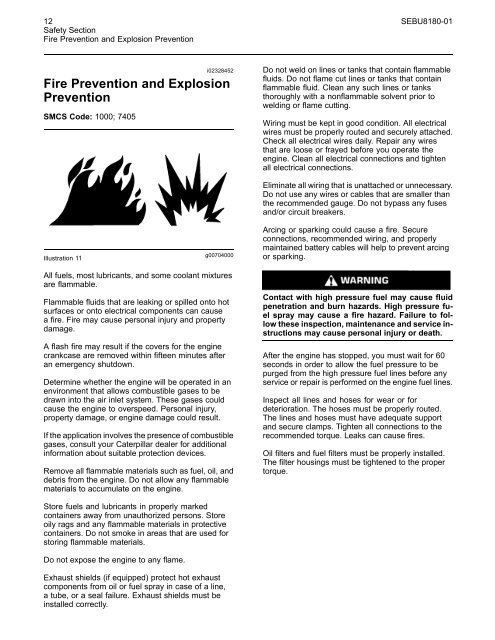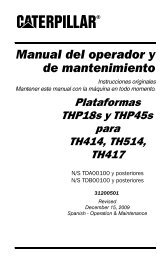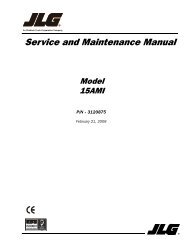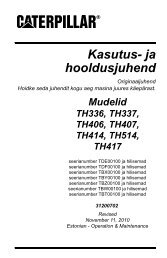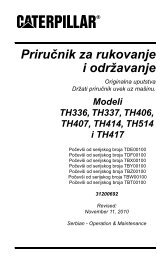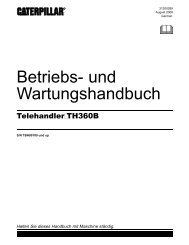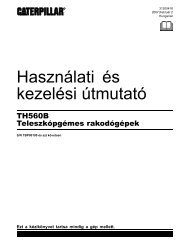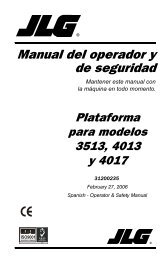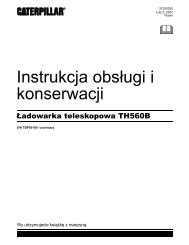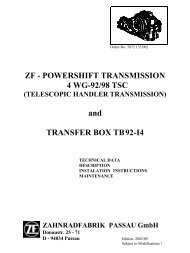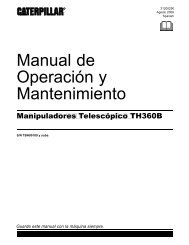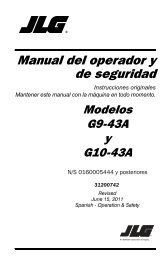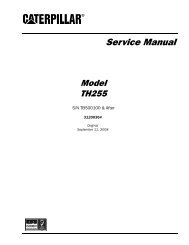Operation and Maintenance Manual
Engine - JLG
Engine - JLG
- No tags were found...
You also want an ePaper? Increase the reach of your titles
YUMPU automatically turns print PDFs into web optimized ePapers that Google loves.
12 SEBU8180-01<br />
Safety Section<br />
Fire Prevention <strong>and</strong> Explosion Prevention<br />
i02328452<br />
Fire Prevention <strong>and</strong> Explosion<br />
Prevention<br />
SMCS Code: 1000; 7405<br />
Do not weld on lines or tanks that contain flammable<br />
fluids. Do not flame cut lines or tanks that contain<br />
flammable fluid. Clean any such lines or tanks<br />
thoroughly withanonflammable solvent prior to<br />
welding or flame cutting.<br />
Wiring must be keptingoodcondition.Allelectrical<br />
wires must be properly routed <strong>and</strong> securely attached.<br />
Check all electrical wires daily. Repair any wires<br />
that are loose or frayed before you operate the<br />
engine. Clean all electrical connections <strong>and</strong> tighten<br />
all electrical connections.<br />
Illustration 11<br />
g00704000<br />
Eliminate all wiring that is unattached or unnecessary.<br />
Do not use any wires or cables that are smaller than<br />
the recommended gauge. Do not bypass any fuses<br />
<strong>and</strong>/or circuit breakers.<br />
Arcing or sparking could cause a fire. Secure<br />
connections, recommended wiring, <strong>and</strong> properly<br />
maintained battery cables will help to prevent arcing<br />
or sparking.<br />
All fuels, most lubricants, <strong>and</strong> some coolant mixtures<br />
are flammable.<br />
Flammable fluids that are leaking or spilled onto hot<br />
surfaces or onto electrical components can cause<br />
a fire. Fire may cause personal injury <strong>and</strong> property<br />
damage.<br />
A flash fire may result if the covers for the engine<br />
crankcase are removed within fifteen minutes after<br />
an emergency shutdown.<br />
Determine whether the engine will be operated in an<br />
environment that allows combustible gases to be<br />
drawn into the air inlet system. These gases could<br />
cause the engine to overspeed. Personal injury,<br />
property damage, or engine damage could result.<br />
If the application involves the presence of combustible<br />
gases, consult your Caterpillar dealer for additional<br />
information about suitable protection devices.<br />
Remove all flammable materials such as fuel, oil, <strong>and</strong><br />
debris from the engine. Do not allow any flammable<br />
materials to accumulate on the engine.<br />
Contact with high pressure fuel may cause fluid<br />
penetration <strong>and</strong> burn hazards. High pressure fuel<br />
spray may cause a fire hazard. Failure to follow<br />
these inspection, maintenance <strong>and</strong> service instructions<br />
may cause personal injury or death.<br />
After the engine has stopped, you must wait for 60<br />
seconds in order to allow the fuel pressure to be<br />
purged from the high pressure fuel lines before any<br />
service or repair is performed on the engine fuel lines.<br />
Inspect all lines <strong>and</strong> hoses for wear or for<br />
deterioration. The hoses must be properly routed.<br />
The lines <strong>and</strong> hoses must have adequate support<br />
<strong>and</strong> secure clamps. Tighten all connections to the<br />
recommended torque. Leaks can cause fires.<br />
Oil filters <strong>and</strong> fuel filters must be properly installed.<br />
The filter housings must be tightened to the proper<br />
torque.<br />
Store fuels <strong>and</strong> lubricants in properly marked<br />
containers away from unauthorized persons. Store<br />
oily rags <strong>and</strong>anyflammable materials in protective<br />
containers. Do not smoke in areas that are used for<br />
storing flammable materials.<br />
Do not expose the engine to any flame.<br />
Exhaust shields (if equipped) protect hot exhaust<br />
components from oil or fuel spray in case of a line,<br />
a tube, or a seal failure. Exhaust shields must be<br />
installed correctly.


